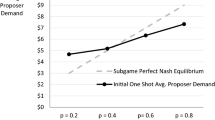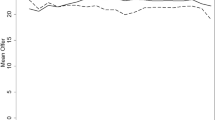Abstract
Individuals often need to negotiate how to distribute jointly produced goods—equally (e.g., 50:50) or equitably (e.g., proportionally to their contributions). We examined whether people have stable preferences, or whether they switch between equality and equity in different situations. Pairs of anonymous participants first produced a common pie, and then distributed it in an ultimatum game. Results suggest that individuals apply different justice principles depending on their contribution. When they produced less than 50%, proposers divided the pie equally. However, when they produced more than 50%, their offers fell between equality and equity. Responders’ ratings of fairness and satisfaction varied similarly; with low production, equality was preferred, whereas with high production, equity was preferred. Nevertheless, equal and equitable offers were generally accepted, and only outright unfair offers were rejected. This suggests that individuals are relatively flexible about which justice principle should be applied, but punish proposers whose offers violate both principles.



Similar content being viewed by others
Notes
There was no difference between the first and the second half of participants with regards to proposers’ offers and responders’ decisions and satisfaction ratings (all T’s < 1). Hence, this additional rating did not affect behavior.
References
Adams, J. S. (1965). Inequity in social exchange. In L. Berkowitz (Ed.), Advances in experimental social psychology (pp. 267–297). New York: Academic Press.
Almas, I., Cappelen, A. W., Sorensen, E. O., & Tungodden, B. (2010). Fairness and the development of inequality acceptance. Science, 328, 1176–1178.
Babcock, L., Loewenstein, G., Issacharoff, S., & Camerer, C. (1995). Biased judgments of fairness in bargaining. American Economic Review, 85, 1337–1343.
Blount, S. (1995). When social outcomes aren’t fair—The effect of causal attributions on preferences. Organizational Behavior and Human Decision Processes, 63, 131–144.
Blount, S., & Larrick, R. P. (2000). Framing the game: Examining frame choice in bargaining. Organizational Behavior and Human Decision Processes, 81, 43–71.
Bohnet, I., & Frey, B. S. (1999). Social distance and other-regarding behavior in dictator games: Comment. American Economic Review, 89, 335–339.
Bolton, G. E., & Zwick, R. (1995). Anonymity versus punishment in ultimatum bargaining. Games and Economic Behavior, 10, 95–121.
Brandts, J., & Charness, G. (2011). The strategy versus the direct-response method: A first survey of experimental comparisons. Experimental Economics, 14, 375–398.
Brosnan, S. F., & De Waal, F. B. (2003). Monkeys reject unequal pay. Nature, 425, 297–299.
Camerer, C. (2003). Behavioral game theory: Experiments in strategic interaction. New York, NY; Princeton, NJ: Russell Sage Foundation; Princeton University Press.
Cappelen, A. W., Hole, A. D., Sorensen, E. O., & Tungodden, B. (2007). The pluralism of fairness ideals: An experimental approach. American Economic Review, 97, 818–827.
Charness, G., & Gneezy, U. (2008). What’s in a name? Anonymity and social distance in dictator and ultimatum games. Journal of Economic Behavior & Organization, 68, 29–35.
Cherry, T. L., Frykblom, P., & Shogren, J. F. (2002). Hardnose the dictator. American Economic Review, 92, 1218–1221.
Cherry, B., Ordonez, L. D., & Gilliland, S. W. (2003). Grade expectations: The effects of expectations on fairness and satisfaction perceptions. Journal of Behavioral Decision Making, 16, 375–395.
Cohen-Charash, Y., & Spector, P. E. (2001). The role of justice in organizations: A meta-analysis. Organizational Behavior and Human Decision Processes, 86, 278–321.
Curhan, J. R., Elfenbein, H. A., & Xu, H. (2006). What do people value when they negotiate? Mapping the domain of subjective value in negotiation. Journal of Personality and Social Psychology, 91, 493–512.
Deutsch, M. (1975). Equity, equality, and need—What determines which value will be used as basis of distributive justice. Journal of Social Issues, 31, 137–149.
Fehr, E., Goette, L., & Zehnder, C. (2009). A behavioral account of the labor market: The role of fairness concerns. Annual Review of Economics, 1, 355–384.
Fehr, E., & Schmidt, K. M. (1999). A theory of fairness, competition, and cooperation. Quarterly Journal of Economics, 114, 817–868.
Forsythe, R., Horowitz, J. L., Savin, N. E., & Sefton, M. (1994). Fairness in simple bargaining experiments. Games and Economic Behavior, 6, 347–369.
Frohlich, N., Oppenheimer, J., & Kurki, A. (2004). Modeling other-regarding preferences and an experimental test. Public Choice, 119, 91–117.
Gächter, S., & Thöni, C. (2010). Social comparison and performance: Experimental evidence on the fair wage–effort hypothesis. Journal of Economic Behavior & Organization, 76(3):531–543.
Gantner, A., Guth, W., & Konigstein, M. (2001). Equitable choices in bargaining games with joint production. Journal of Economic Behavior & Organization, 46, 209–225.
Glimcher, P. W., Camerer, C., Poldrack, R. A., & Fehr, E. (2009). Neuroeconomics: Decision making and the brain. London; San Diego, CA; Burlington, MA: Academic Press Elsevier.
Greenberg, J., & Cohen, R. L. (1982). Equity and justice in social behavior. New York: Academic Press.
Guth, W., Schmittberger, R., & Schwarze, B. (1982). An experimental analysis of ultimatum bargaining. Journal of Economic Behavior & Organization, 3, 367–388.
Henrich, J., Mcelreath, R., Barr, A., Ensminger, J., Barrett, C., Bolyanatz, A., et al. (2006). Costly punishment across human societies. Science, 312, 1767–1770.
Hoffman, E., Mccabe, K., Shachat, K., & Smith, V. (1994). Preferences, property-rights, and anonymity in bargaining games. Games and Economic Behavior, 7, 346–380.
Hoffman, E., Mccabe, K. A., & Smith, V. L. (1996). On expectations and the monetary stakes in ultimatum games. International Journal of Game Theory, 25, 289–301.
Homans, G. C. (1961). Social behavior: Its elementary forms. New York: Harcourt.
Kahneman, D., Knetsch, J. L., & Thaler, R. H. (1986a). Fairness and the assumptions of economics. Journal of Business, 59, S285–S300.
Kahneman, D., Knetsch, J. L., & Thaler, R. H. (1986b). Fairness as a constraint on profit seeking—Entitlements in the market. American Economic Review, 76, 728–741.
Komorita, S. S., & Chertkof, J. M. (1973). Bargaining theory of coalition formation. Psychological Review, 80, 149–162.
Leliveld, M. C., Van Dijk, E., & Van Beest, I. (2008). Initial ownership in bargaining: Introducing the giving, splitting, and taking ultimatum bargaining game. Personality and Social Psychology Bulletin, 34, 1214–1225.
Loewenstein, G., Issacharoff, S., Camerer, C., & Babcock, L. (1993). Self-serving assessments of fairness and pretrial bargaining. Journal of Legal Studies, 22, 135–159.
Messick, D. M., & Sentis, K. P. (1979). Fairness and preference. Journal of Experimental Social Psychology, 15, 418–434.
Mikula, G. (1980). Justice and social interaction: Experimental and theoretical contributions, from psychological research. New York: Springer-Verlag.
Mikula, G., Scherer, K. R., & Athenstaedt, U. (1998). The role of injustice in the elicitation of differential emotional reactions. Personality and Social Psychology Bulletin, 24, 769–783.
Oxoby, R. J., & Spraggon, J. (2008). Mine and yours: Property rights in dictator games. Journal of Economic Behavior & Organization, 65, 703–713.
Pillutla, M. M., & Murnighan, J. K. (1996). Unfairness, anger, and spite: Emotional rejections of ultimatum offers. Organizational Behavior and Human Decision Processes, 68, 208–224.
Range, F., Horn, L., Viranyi, Z., & Huber, L. (2009). The absence of reward induces inequity aversion in dogs. Proceedings of the National Academy of Sciences of the United States of America, 106, 340–345.
Rinck, M., & Becker, E. S. (2007). Approach and avoidance in fear of spiders. Journal of Behavioral Therapy and Experimental Psychiatry, 38, 105–120. doi:10.1016/j.jbtep.2006.10.001.
Rodriguez-Lara, I., & Moreno-Garrido, L. (2010). Self-interest and justice principles. Instituto Valenciano de Investigaciones Económicas working paper, serie AD.
Ruffle, B. J. (1998). More is better, but fair is fair: Tipping in dictator and ultimatum games. Games and Economic Behavior, 23, 247–265.
Scherer, K. R. (Ed.). (1992). Issues in the study of justice. Cambridge: Cambridge University Press.
Schwinger, T. (1980). Gerechte Güter-Verteilungen: Entscheidungen zwischen drei Prinzipien. I. In G. Mikula (Ed.), Gerechtigkeit und soziale Interaktion. Bern: Verlag Hans Hubere.
Shapiro, E. G. (1975). Effect of expectations of future interaction on reward allocations in dyads—Equity or equality. Journal of Personality and Social Psychology, 31, 873–880.
Singer, T., Kiebel, S. J., Winston, J. S., Dolan, R. J., & Frith, C. D. (2004). Brain responses to the acquired moral status of faces. Neuron, 41, 653–662.
Skitka, L. J., Winquist, J., & Hutchinson, S. (2003). Are outcome fairness and outcome favorability distinguishable psychological constructs? A meta-analytic review. Social Justice Research, 16, 309–341.
Szymanski, D. M., & Henard, D. H. (2001). Customer satisfaction: A meta-analysis of the empirical evidence. Journal of the Academy of Marketing Science, 29, 16–35.
Tabibnia, G., & Lieberman, M. D. (2007). Fairness and cooperation are rewarding: evidence from social cognitive neuroscience. Annals of the New York Academy of Sciences, 1118, 90–101.
Thompson, L., & Loewenstein, G. (1992). Egocentric interpretations of fairness and interpersonal conflict. Organizational Behavior and Human Decision Processes, 51, 176–197.
Van Den Bos, K., Wilke, H. A. M., Lind, E. A., & Vermunt, R. (1998). Evaluating outcomes by means of the fair process effect: Evidence for different processes in fairness and satisfaction judgments. Journal of Personality and Social Psychology, 74, 1493–1503.
Van Dijk, E., De Cremer, D., & Handgraaf, M. J. J. (2004). Social value orientations and the strategic use of fairness in ultimatum bargaining. Journal of Experimental Social Psychology, 40, 697–707.
Van’t Wout, M., Kahn, R. S., Sanfey, A. G., & Aleman, A. (2006). Affective state and decision-making in the ultimatum game. Experimental Brain Research, 169, 564–568.
Acknowledgments
This study was supported by a Grant No. 105514-123671 from the European Science Foundation and the Swiss National Science Foundation and a Grant No. 230331 from the European Research Council. The study also received financial support from the Swiss National Centre of Competence in Research in the Affective Sciences, project No. 51NF40-128911.
Author information
Authors and Affiliations
Corresponding author
Rights and permissions
About this article
Cite this article
Bediou, B., Sacharin, V., Hill, C. et al. Sharing the Fruit of Labor: Flexible Application of Justice Principles in an Ultimatum Game with Joint-Production. Soc Just Res 25, 25–40 (2012). https://doi.org/10.1007/s11211-012-0151-1
Published:
Issue Date:
DOI: https://doi.org/10.1007/s11211-012-0151-1




